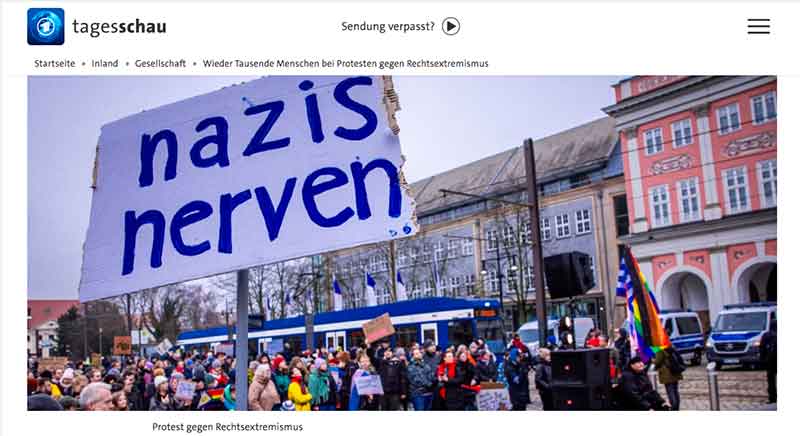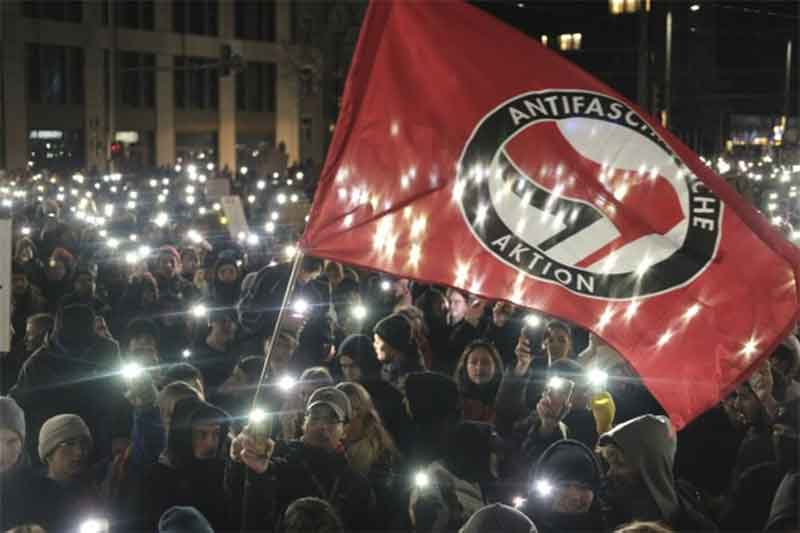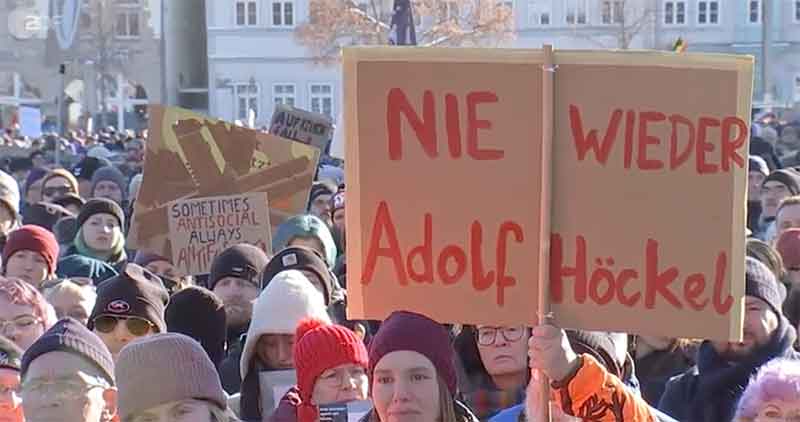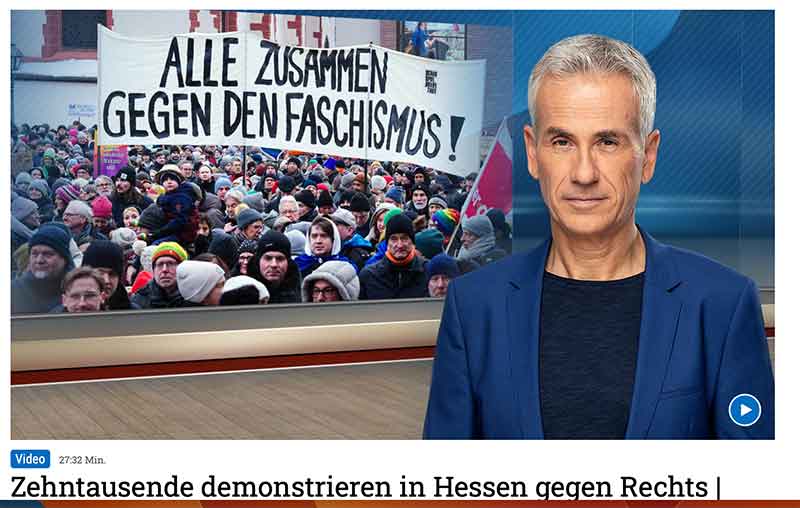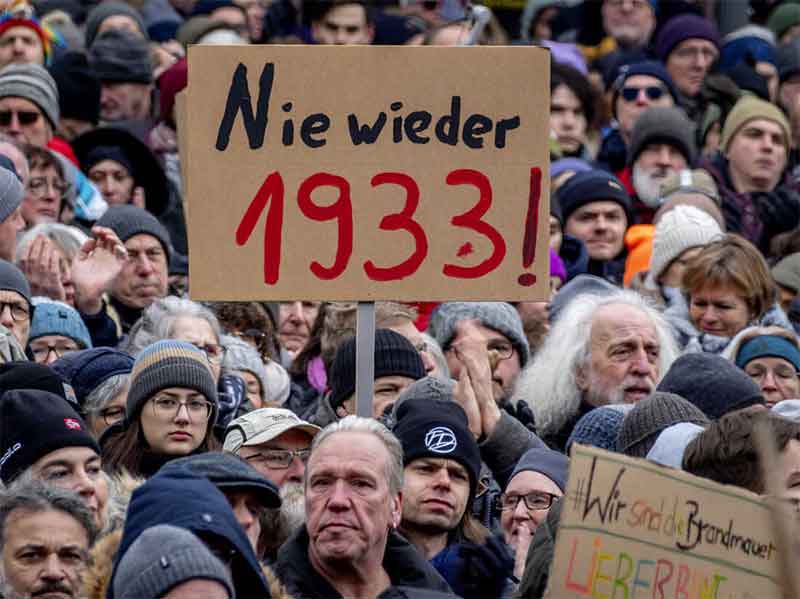
More than 100,000 people marched in cities across Germany on Saturday to protest the rise of the country’s leading far-right party.
Anger toward the Alternative für Deutschland (AfD) party began brewing after it was revealed that members of the far-right faction discussed implementing mass deportations of migrants. Opponents labeled the plan a vestige of the Nazi era and took to the streets in numerous cities.
At least 35,000 people marched in Frankfurt, many carrying banners saying, “Defend democracy — Frankfurt against the AfD.”
Similar protests were also seen in the cities of Hamburg, Stuttgard, Dortmund and Nuremberg. A large demonstration in Berlin is also being planned for Sunday.
Germany Could Copy Brexit, Says AFD Leader
Britain was “dead right” to leave the European Union and Germany could end up following suit, Alternative for Germany (AfD) leader Alice Weidel has said.
Weidel’s right-wing faction has become the country’s second-most popular party, according to polls, despite left-wing protests and rumors of an impending ban.
In an interview with the Financial Times published on Monday, Weidel said that an AfD-led government would seek to reform the EU to wrest back national sovereignty from the “unelected executive” that is the European Commission. Should this fail, she said that she would “let the people decide” whether or not the country would stay in the union, “just as Britain did.”
The UK’s 2016 Brexit referendum is “a model for Germany, that one can make a sovereign decision like that,” she added.
The AfD has long called for the “orderly dissolution of the EU,” but dropped this language from its latest policy document, published last summer. The new paper describes the EU as a “failed project,” and calls for the bloc to be reformed as a “federation of European nations,” with all EU laws that supersede national law to be scrapped.
The AfD opposes the EU’s migrant resettlement quotas, its environmental policies, its military reliance on the U.S., and its embargo on Russian fossil fuel imports.
Since its inception in 2013, the AfD has become best known for its hardline stance on immigration. If elected, Weidel told the Financial Times that her party would “introduce effective border controls and immediately deport foreign criminals.”
This position saw the AfD surge in support after former Chancellor Angela Merkel opened the country to more than one million non-European migrants in 2015. The party is now polling at around 23%, eight points ahead of Chancellor Olaf Scholz’ Social Democrats (SPD) and second only to Merkel’s Christian Democrats (CDU).
Scholz’ party has reacted with panic. After it emerged last week that some AfD lawmakers met with Austrian right-wing activist Martin Sellner last year to discuss the potential “remigration” of criminal and “non-assimilated” immigrants from Germany, more than two dozen Social Democrat parliamentarians urged the government to ban the AfD over its allegedly “extremist” positions.
A parliament-funded watchdog group called for such a ban last year, while a court in Cologne ruled in 2022 that Germany’s domestic intelligence agency could legally place the party under surveillance.
Over the weekend, left-wing groups marshaled hundreds of thousands of demonstrators onto the streets of Berlin, Cologne, Hamburg, and other major cities to protest against the party.
These protests will not stop the “inevitable” participation of the AfD in government, Weidel told the Financial Times. However, while the party may score some wins in upcoming state elections this year, she said that the refusal of Germany’s major parties to work with the AfD will likely prevent it from coming to power in Berlin until the federal election in 2029.
The center-right CDU will be the first party to abandon its boycott, Weidel predicted. Elections in the state of Hesse last year proved “that we can form a clear right-wing majority. And the CDU can’t refuse to accept that in the long term,” she said.
Most Germans Want Scholz To Step Down, Finds Poll
Public support for German Chancellor Olaf Scholz has fallen to record lows, the tabloid Bild reported on Monday, citing a survey conducted by the INSA polling institute. Almost two-thirds of Germans want him to resign before the next federal election, scheduled for October 2025, the data suggests.
As many as 64% of respondents told INSA that Scholz should vacate his position and hand it over to Defense Minister Boris Pistorius, a fellow Social Democrat. Less than a quarter of Germans oppose this prospect.
Scholz would also lose an election against any of his major rivals, the poll shows. Only 23% of Germans would support the current chancellor against Friedrich Merz, the leader of the opposition CDU. Merz himself would enjoy the backing of 26% of voters.
Should Scholz face off against Markus Soeder, the leader of the Christian Social Union (CSU) – the traditional CDU ally in Bavaria – Soeder would secure a clear victory with 36% to 20%. Pistorius would claim a narrow victory against Merz with 25% to 23%, but would still lose to Soeder 25% to 34%, the survey said. Under German law, the chancellor is confirmed by MPs on the proposal of the federal president.
Soeder currently serves as governor of Germany’s most populous state and is known for his criticism of Scholz’s policies. In November, he warned that Germany was in a “serious crisis,” slamming the chancellor’s cabinet over its budget and police failures, adding that the “government has gone bankrupt.”
The Bavarian politician also criticized the federal government’s strategy of using only subsidies to combat price hikes resulting from forgoing Russian energy supplies. He also criticized Berlin for, as he said, prioritizing military aid to Ukraine over the nation’s own security.
The INSA poll shows that Olaf Scholz’s SPD has the support of just 16% of Germans, 15 percentage points behind the CDU and seven percentage points behind the right-wing AfD party.
On Monday, Bild described Scholz as “the most unpopular chancellor of all time.”
74% of Germans Think Scholz Failing At His Job – YouGov Poll
In December 2023, an opinion poll by YouGov found:
The majority of Germans disapprove of Olaf Scholz’s performance as chancellor.
His traffic-light coalition government is seen equally unfavorably by the country’s population, the survey revealed.
On Friday, a separate poll by ARD-DeutschlandTrend showed that after two years in office the level of public dissatisfaction is the highest on record for a sitting chancellor.
The YouGov survey, which was conducted over December 1-6 and the results of which were published on Saturday, involved 2,119 respondents. According to its findings, some 74% of respondents said Scholz was doing a poor job, with only 20% seeing his performance in a positive light. As for the entire coalition government, 73% said they were unhappy with it, while only 22% responded that they were satisfied. This is the worst monthly figure since the coalition came to power.
Some 77% said they place little or no trust in the way Scholz is governing Germany, a figure that reaches 60% among supporters of the chancellors’ own Social Democratic party.
When asked which politician they would like to take over the reins in the country, 15% named Bavarian Governor Markus Soeder, with the AfD co-chairwoman and the leader of the party’s parliamentary group, Alice Weidel, enjoying the support of another 12%. Sahra Wagenknecht, who was a prominent member of the Left party, but left it and announced back in October that she would form a new party, garnered 8%. Other political figures trailed behind this trio.
ARD-DeutschlandTrend on Friday painted a similarly grim picture for the chancellor, with just 20% of respondents assessing his work as satisfactory, and only 27% saying that he can do the job at all.
Meanwhile, 82% of Germans were dissatisfied with the performance of the country’s traffic-light coalition government. Of the ministers, only defense chief Boris Pistorius was rated favorably by a slight majority of respondents (52%). Others failed to receive the support of more than 38% of respondents.
The recent budget crisis seems to have dealt a further blow to the already waning approval ratings of the chancellor and government. After the Constitutional Court shot down an attempt to repurpose €60 billion ($65 billion) of funds left over after the Covid-19 pandemic, Scholz’s government has had to freeze most of its new spending commitments.
Germany Should Prepare For Russian Attack, Says German Defense Chief
Germany should be ready to respond to a possible Russian attack, Defense Minister Boris Pistorius has warned. He said that to prepare for such a scenario, Germany and its NATO allies must commit to strengthening their military capabilities.
In an interview with German public broadcaster ZDF on Monday, the defense chief pointed out that while Germany is not currently under a direct threat of attack, the country should do its best to be prepared for it.
If Germany wants to be ready for an attack “that you do not know if and when it will occur, then that means you have to arm yourself – and that is what we are currently doing together with allies in NATO,” he explained.
Pistorius went on to say that “deterrence is the only effective means of positioning oneself against an aggressor from the outset” as it signals to a potential adversary that the target is capable of striking back. To achieve such a posture, however, Germany must have “a credible deterrent” and be able to “wage a war that is forced upon us,” he noted.
Commenting on a potential scenario in which Russia attacked the Baltics, Pistorius remarked that Berlin was setting up its “Lithuania Brigade” specifically to address those concerns. The unit, composed of about 4,800 soldiers is expected to be ready by 2027 and will be the first German force to be permanently stationed abroad since World War II.
Pistorius suggested that amid the Ukraine conflict it would take Russia at least several years to be ready for a full-scale offensive, and that Western countries should use the time to intensively arm themselves.
The German tabloid Bild reported earlier this month, citing a classified document, that Germany is preparing for a scenario in which Russia launches an “open attack” on NATO in mid-2025, following major victories in Ukraine. Moscow mocked the prediction as a “zodiac forecast.”
Russian President Vladimir Putin has dismissed claims that Russia could attack NATO as “complete nonsense,” arguing that Moscow has “no geopolitical, economic or military interest” in doing so. Still, the Kremlin has for decades voiced concerns about the U.S.-led military bloc’s expansion towards Russian borders, viewing it as an existential threat.
Germany Preparing For Potential Russia-NATO War, Says Bild
Germany is preparing for a scenario in which Russia launches an “open attack” on NATO in the summer of 2025 after scoring major victories against Ukraine, Bild reported on Sunday, citing classified documents. Moscow has repeatedly denied having any plans to attack the U.S.-led military bloc.
The secret German defense ministry paper reportedly seen by the outlet provides a month-by-month outline of a possible “path to the conflict” between the West and Russia. The scenario begins a new mobilization in February 2024 with Russia calling up an additional 200,000 troops. Moscow has insisted it does not need to pursue such a measure, citing an abundance of volunteers.
According to the scenario outlined in the document, Moscow then launches a powerful spring offensive against Ukraine resulting in Kiev, suffering from inadequate Western support, yielding ground.
The report then describes Russia launching an “initially covert and later increasingly open attack” on the Baltic states in July, waging cyberwarfare and inciting riots among the local Russian-speaking population.
The crisis precipitates a Russian military build-up in western Russia, Belarus, and Kaliningrad. At the same time, Moscow positions itself to seize the Suwalki Gap, according to the paper – a narrow strip of land in northeast Poland between Belarus and Kaliningrad, resulting in “riots with numerous deaths,” with Russia accusing NATO of preparing to attack the country.
Poland and the Baltic states report an “increasing threat from Russia” to a NATO Council meeting in January 2025. Moscow, however, uses the development as a pretext to move additional troops to the border areas in March 2025.
Amid the rising tensions depicted, Germany contributes 30,000 troops to the alliance’s build-up efforts. According to the strategic forecast, NATO decides on “measures for credible deterrence” in May 2025. The scenario ends at this point, with Bild noting that it is an “open question” whether Russia chooses to stand down under these circumstances.
Russian Foreign Ministry spokeswoman Maria Zakharova scoffed at the report, calling it “last year’s powerful zodiac forecast.”
Russian President Vladimir Putin has denied any plans to attack NATO, arguing that Moscow has “no geopolitical, economic or military interest” in waging war against the bloc.
Russia, however, has for decades voiced concerns about the alliance’s expansion towards its borders, viewing it as an existential threat. Putin earlier cited Ukraine’s desire to join the bloc as one of the key reasons for the current conflict.


